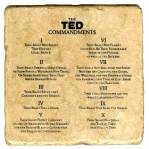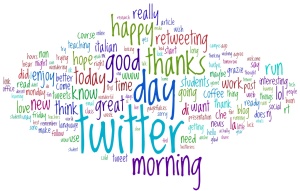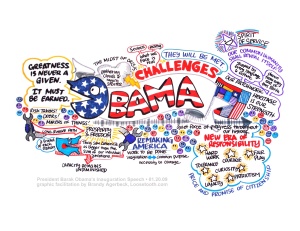I wasn’t going to write a post complaining about a conference, but then I clicked a link and read the post (from which I borrowed the image below) and realized it was a “sign”…I had to share my nasty experience.
On Mother’s Day, I was scheduled to present at the 29th annual conference of an American Italian association. As the process with all conferences, I submitted a proposal in late November, was notified in late January and the program was released in March. I was disappointed that I was presenting on a Sunday morning (session started at 9:30) because I realized that my tweeps on Twitter, the subject of my talk, would probably not be online on that day, at that hour. Then I realized it was not just any Sunday, but Mother’s Day, and that my parents were going to be in town visiting, so I was also annoyed. I opted, however, being the conscientious presenter that I am, to attend rather than pull a no-show.
- Sunday morning arrives, I wish my mother a happy mother’s day and leave the house at approx 7:45.
- I drive into the city, the traffic through the Holland Tunnel paralleling what I expected Twitter traffic to be that morning.
- I arrive to the conference location at approx 8:15.
- There was another presentation on Italian literature in the room in which I was to present. I waited in the corridor for that session to let out. It finally did, 15 minutes later than scheduled. So our session was late.
- I was the 4th of 4 speakers.
- It was a technology session.
- None of the other speakers could figure out how to use the two trolleys of technological equipment.
- There was no one to help out. I became the designated tech assistant.
- At this point, we are approx 25 minutes late to start. Speaker one speaks. Nasty.
- Speaker two presents. Interesting talk on podcasts but really nothing new.
- Third speaker speaks…for 35 minutes!!! Chair of session does not monitor time nor stop #3.
- Session ends at 10:45.
- I am told to start my presentation at 10:50. Screw the PowerPoint, I don’t have time to load it up on the various trolleys. I am angry…visibly.
- I log onto Twitter (need a hard connection, no wireless). Internet connection weak. Twitter community very quiet.
- I tell them students enjoyed it, try to explain the benefits.
- At 10: 55, first interruption from a speaker in the next session. Chair tells her we still have 5 minutes.
- At 10:58, chair of next session comes in and says “we have people who need to catch flights and they want to know how much longer you will be?” Angrily, I bark, “Give me 1 and a half minutes!”
- Check Twitter replies. Limited shoutouts.
- I tell them if they are interested in my work to read chapter 4 of the Calico 2009 Monograph.
The end. Can you determine how many of the Ted Commandments were broken in this story? 😉
- 1. Thou Shalt Not Simply Trot Out thy Usual Shtick
- Thou Shalt Dream a Great Dream, or Show Forth a Wondrous New Thing, Or Share Something Thou Hast Never Shared Before.
- Thou Shalt Reveal thy Curiosity and Thy Passion.
- Thou Shalt Tell a Story.
- Thou Shalt Freely Comment on the Utterances of Other Speakers for the Sake of Blessed Connection and Exquisite Controversy.
- Thou Shalt Not Flaunt thine Ego. Be Thou Vulnerable. Speak of thy Failure as well as thy Success.
- Thou Shalt Not Sell from the Stage: Neither thy Company, thy Goods, thy Writings, nor thy Desperate need for Funding; Lest Thou be Cast Aside into Outer Darkness.
- Thou Shalt Remember all the while: Laughter is Good.
- Thou Shalt Not Read thy Speech.
- Thou Shalt Not Steal the Time of Them that Follow Thee.




